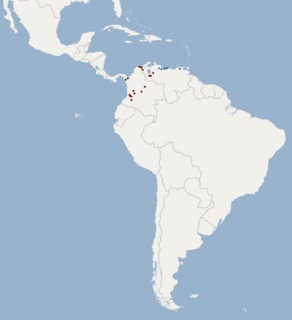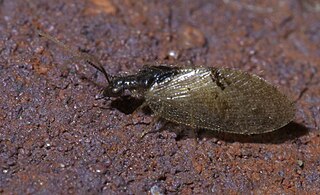
The shadowy broad-nosed bat is a species of bat in the family Phyllostomidae. It is found in Colombia and Venezuela.

Lasius umbratus, colloquially known as the yellow shadow ant and yellow lawn ant, is a palearctic species of parasitic ant distributed across Eurasia and the Maghreb region of Africa. It was once thought that this species occurred in North America as well, but comparative genomic studies indicate the Afro-Eurasian and American populations are discrete and not closely related enough to represent a single species. The North American populations are now treated as a different species, Lasius aphidicola.

Hemerobius is a genus of lacewings in the family Hemerobiidae. It is found throughout Europe and North America. Like most lacewings, both the larvae and adults are predatory, primarily eating acarines, scale insects, psyllids, aphids, thrips, and the eggs of lepidopterans and whiteflies.

Sympherobius is a genus of brown lacewings in the family Hemerobiidae. There are at least 50 described species in Sympherobius.
Sympherobius occidentalis is a species of brown lacewing in the family Hemerobiidae. It is found in North America.
Aradus behrensi is a species of flat bug in the family Aradidae. It is found in North America.

Nyctelius nyctelius, known generally as the violet-banded skipper or nyctelius skipper, is a species of grass skipper in the butterfly family Hesperiidae. It is found in Central America, North America, and South America.
Aradus acutus is a species of flat bug in the family Aradidae. It is found in North America.
Aradus borealis is a species of flat bug in the family Aradidae. It is found in North America.
Largus pallidus is a species of bordered plant bug in the family Largidae. It is found in North America.
Aradus shermani is a species of flat bug in the family Aradidae. It is found in North America.
Aneurus borealis is a species of flat bug in the family Aradidae. It is found in North America.
Aradus intectus is a species of flat bug in the family Aradidae. It is found in North America.
Dialytes is a genus of aphodiine dung beetles in the family Scarabaeidae. There are about five described species in Dialytes.
Sympherobius amiculus is a species of brown lacewing in the family Hemerobiidae. It is found in the Caribbean Sea and North America.
Sympherobius californicus is a species of brown lacewing in the family Hemerobiidae. It is found in Central America, North America, and Oceania. The species was introduced to New Zealand to prey on aphids and mealybugs affecting crops, first noted in 1936, however was not able to be established.
Mezira pacifica is a species of flat bug in the family Aradidae. It is found in North America.

Sympherobius barberi, or Barber's brown lacewing, is a species of brown lacewing in the family Hemerobiidae. It is found in Europe & Northern Asia, Central America, North America, Oceania, and South America. The species was introduced to New Zealand to prey on aphids and mealybugs, first noted in 1936, however was not able to be established.
Sympherobius killingtoni is a species of brown lacewing in the family Hemerobiidae. It is found in Central America and North America.
Aradus basalis is a species of flat bug in the family Aradidae. It is found in North America.





